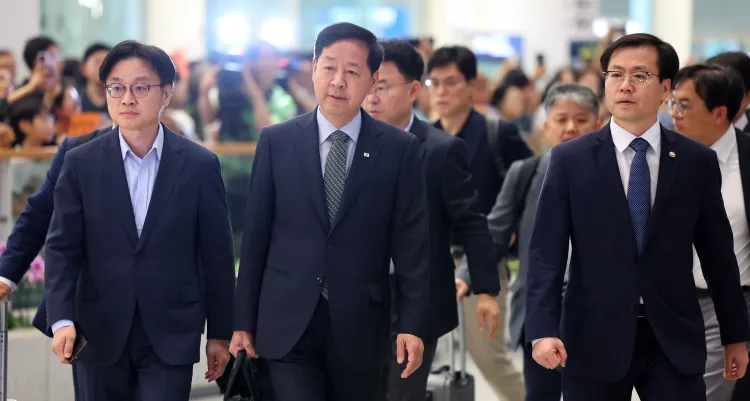Has South Korea Overcome Export Uncertainties with the US Tariff Deal?

Synopsis
Key Takeaways
- Trade agreement with the US reduces export uncertainties.
- Tariffs on South Korean goods are lowered from 25% to 15%.
- Investment pledge of US$350 billion in the US.
- Focus on enhancing competitiveness in strategic sectors.
- Collaboration with the US is a priority for the government.
Seoul, Aug 4 (NationPress) The recent trade agreement with the United States has significantly reduced the uncertainties impacting South Korea's exports, as stated by the country's industry minister on Monday. He promised to implement further strategies aimed at enhancing the competitiveness of Korean enterprises.
The Industry Minister Kim Jung-kwan noted, "Thanks to the trade agreement with the US, the immediate export uncertainties faced by Korean firms have been alleviated. We have managed to secure terms that are favorable compared to our global competitors." This statement was made during a meeting focused on shaping export strategies in response to US tariff policies.
Officials from the Ministry of Trade, Industry and Energy, prominent business organizations like the Korea Chamber of Commerce and Industry and the Korea International Trade Association, along with representatives from key sectors like automotive, semiconductor, and shipbuilding industries participated in this meeting.
Minister Kim expressed, "The government is committed to enhancing collaboration with the US in critical areas such as shipbuilding, automotive, semiconductor, and biopharmaceutical sectors, while also assisting Korean companies in exploring new avenues within the US market."
As part of the recent trade deal, the administration under US President Donald Trump has reduced reciprocal tariffs for South Korea from an initially proposed 25 percent to 15 percent. In exchange, Korea has agreed to invest US$350 billion in the US and procure $100 billion of American liquefied natural gas (LNG) and other energy resources. Furthermore, tariffs on Korean automobiles have also been decreased to 15 percent.
Japan and the European Union are subjected to similar tariff rates as South Korea.
Despite this trade agreement, the minister reiterated the necessity of enhancing the core competitiveness of Korean industries and developing additional support mechanisms for export companies amidst the ongoing protectionist stance of the US administration.









